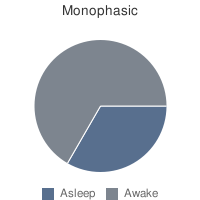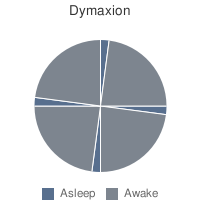|
|
|||
|
|
|

|
|
|
|
|||
|
|
|
|
|
 | ||||
I've recently became enamored and fully immersed into a concept called "Polyphasic Sleeping". Polyphasic sleeping is differentiated apart from "Monophasic Sleeping" -- which is the kind of sleep most of today's world goes by. Strictly speaking, the term "polyphasic" is a generic term that refers to any type of sleeping schedule where there are three or more periods of sleep. The specific type of polyphasic sleep I'm interested in, is widely known as the "Uberman Sleep Schedule".   The Uberman sleep schedule involves taking 20-30 minute naps every 4 hours, thereby getting a total of 2 hours of sleep per 24 hours. This means the Uberman sleeper gets 22 hours of waking life. This, incidentally, is also the widely reputed schedule that Leonardo DaVinci himself is known for. In the same vein of "famous folk", other possible polyphasic sleepers (from what I've gathered) were Henry Ford, Benjamin Franklin and Thomas Jefferson. In the less famous but verified and recorded vein, there is the scientist Dr. Buckminster Fuller, who lived for two years on a slightly different polyphasic sleeping schedule, called the "Dymaxion Sleeping Schedule":  In addition to having a suspectfully cartoonish name, Dr. Buckminster Fuller accomplished what I've gathered thus far to be the most comprehensive scientific study on polyphasic sleep, involving the study of sailors who also sleep polyphasically, as well as his own two-year experimentation. In case you're thinking "Holy crap, how did this guy not die or something?" Dr. Fuller even had routine medical check-ups, and was given a clean bill of health for the two years of Dymaxion sleep. To those of you who aren't familiar with how this works, it may seem bizarre that this is humanly possible -- but I'll get to the "how" in a bit. First, I want to point out that Dr. Fuller's work is far from the end of all polyphasic documentary. In fact, I've been fully submersed into reading what seems to be probably the two most prominent bloggers of polyphasic sleep on the entire Internet (of course, given how small the "22 Hour Society" is, this isn't saying much). First, I've delved into and have perused Steve Pavlina's blog on his Uberman Sleeping: http://www.stevepavlina.com/blog/2005/10/polyphasic-sleep/ Steve's contribution to this matter has been an absolute pleasure to read. He's very detailed, informative, and enlightening. In his "Polyphasic Sleep Logs" (which extends to over a year!), he explains alot of the "psychological effects" of being a Polyphasic Sleeper, which I found both fascinating and inspiriing. I fully recommend reading his input for more of the "nitty gritty". He explains the "how" of Polyphasic sleep -- which to summarize: Everyone gets about 1.5 hours of "REM" sleep, the sleep necessary for the mind to function. The Uberman sleeping schedule trains you to "deep sleep" in each of your naps, thereby getting a total of 2 hours of "REM" sleep. Then there is what just might very well be, the 2nd only to Dr. Buckminster Fuller himself in terms of contribution (she wrote a book called "Ubersleep", and it's pretty much the only book of its kind at the moment), and is even the original source from whom Steve Pavlina reported to learn about Polyphasic Sleeping, PureDoxyk's blog on everything2: http://everything2.com/node/892542 Much like Steve's input, also very fascinating, informative, and inspiring. These two sources are a must-read for anyone further interested in the Uberman Sleep, and the real-life accounts thereof. And as both bloggers are also careful to point out: There's nothing innately unusual about polyphasic sleeping. In fact, many animals are polyphasic sleepers, and so too are all human babies. We were literally born polyphasic sleepers, and we converted to monophasic sleep (or struggle trying to). And from what I've read, I'm going to stick my neck so far out to say that for vast majority of eons that humans have existed on this planet, we were probably polyphasic sleepers, up until maybe the agrarian age or pre-industrial age. So converting to a polyphasic sleeping schedule may indeed by more "natural". At any rate, it's certainly a far more efficient method of sleeping. In fact, sleeping monophasically is seeming more and more akin to "binging": consuming inordinate amounts of something continuously for extended periods of time, often followed by symptoms of "crashing" -- indeed, in this case, sleep inertia. The result is all-day grogginess, curable perhaps by coffee or energy drinks, but with the effects of sleeplessness, thereby increasing a sleep debt, which in turn, leads to a big "payoff" where one has to "binge-sleep" again to recover, and so the cycle continues ad nauseam. Here, the Uberman sleep schedule may be the answer. Now personally, I haven't really had that kind of problem for a long while -- for the most part, I've had my sleep under control: I'd normally get to bed by 10 or 11pm, and that would suffice. On the other hand, I still view sleep as a big inconvenience. It just gets in the way of my productivity, and is really something I'd rather get over with quickly as possible. In essence, I want to maximize the amount of waking life that I have. Here, the Uberman sleep schedule may be the answer -- and that's what I'm going to find out. So this blog is going to be an account of my journey towards the polyphasic lifestyle. Much like Steve Pavlina, I'm going to document my transformation on a regular basis through this blog. Today has in fact been "Day 1". My Uberman sleep schedule will be: 1am, 5am, 9am, 1pm, 5pm, 9pm This is probably going to be a challenging week. From all accounts, the first week of adaptation is the "Week of Hell". So... we'll see how it goes. I'm confident I'll transition quite smoothly, with my discipline, focus, and effort. Feedback welcome. | ||||
| ||||